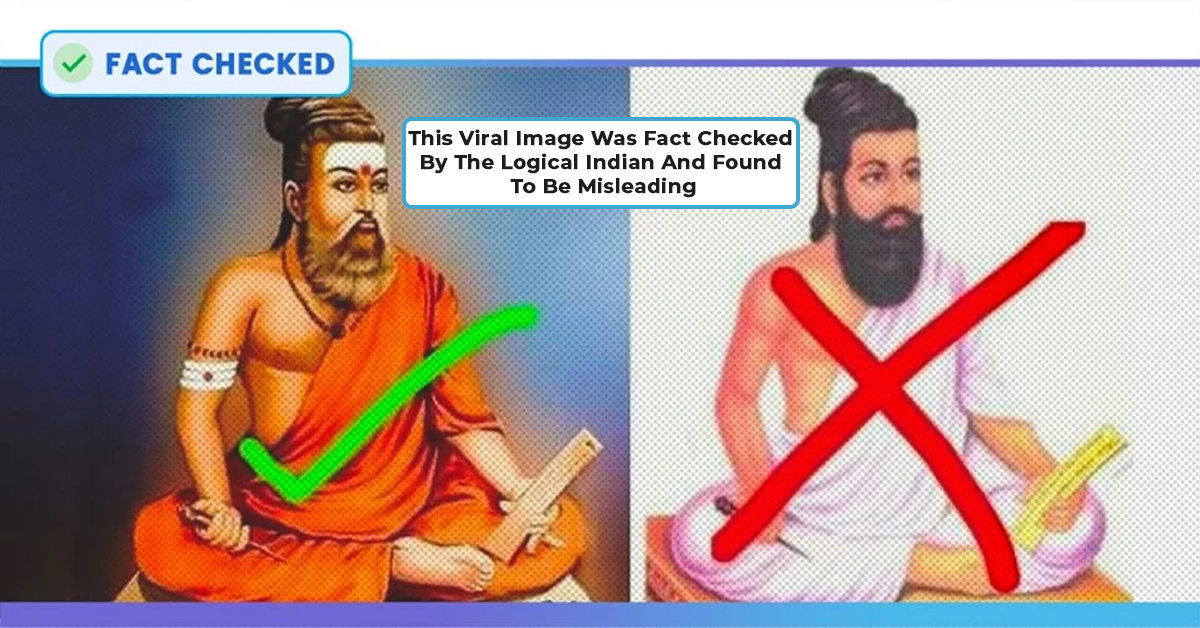The recent controversy surrounding renowned Tamil Poet and Saint Thiruvalluvar after Arjun Sampath, founder of Hindu Makkal Katchi, a Tamil Nadu based hard line fringe party put a saffron robe on his statue, a Rudraksha (holy beads) necklace around its neck and performed a pooja, at Pilayarpatti village in Tamil Nadu’s Thanjavur district has made headlines all around India. The Incident took place on November 6.
Later one edited photo of Thiruvalluvar in a saffron robe was shared on social media. The Bharatiya Janata Party’s (BJP) Tamil Nadu Unit had also posted this image which on November 2, started a war of words between the BJP and the Dravida Munnetra Kazhagam (DMK) on whether Thiruvalluvar was an icon of Hinduism, or if he was beyond all religions and was an icon to Tamilians. BJP vouched for the former whilst DMK spoke for the latter. The opinions of supporters of both parties were as divided as the parties itself.
கற்றதனால் ஆய பயனென்கொல் வாலறிவன்
நற்றாள் தொழாஅர் எனின்கடவுளை தூற்றி, இறைநம்பிக்கை கொண்டவர்களை பழிப்பவர்களுக்கு, அவர்கள் கற்ற கல்வியினால் என்ன பயன்?
அன்றே வள்ளுவர் சொன்னதை இன்று தி.கவும், திமுகவை நம்பி வாழும் கம்யூனிஸ்டுட்களும், அவர்கள் சார்ந்த ஊடகங்களும் அறிந்து தெளிய வேண்டும் pic.twitter.com/xBeXs9aXHa
— BJP Tamilnadu (@BJP4TamilNadu) November 2, 2019
The tweet has got 1932 likes and has 648 retweets. The profile has around 1.8 lakh followers.
A post by Shobhana Ganesan, a Facebook user also went viral on the social media platform. She wrote:
Pic1: Thiruvallur is Hindu Saint. Who Wears Saffron, Poonal, Rudraksha & Vibhudhi Pic2: DMK Dravidian Politics…
Shobhana Ganesan ಅವರಿಂದ ಈ ದಿನದಂದು ಪೋಸ್ಟ್ ಮಾಡಲಾಗಿದೆ ಸೋಮವಾರ, ನವೆಂಬರ್ 4, 2019
Her post received 354 reactions and 563 shares. Her profile has 1545 followers.
The Logical Indian tried to find out if there exists any relation of Thiruvalluvar with Hindu religion, and if the claims made by the right-wing activists are correct?
Who is Thiruvalluvar?
Thiruvalluvar is an ancient saint born in the BC era whose birthdate is not known. He is credited and revered by Tamil people for writing a collection of 1330 poem couplets called ‘Thirukkural,’ which talk about ethics and morality, and is considered to be a guideline to lead a good and righteous life. Thirukkural is widely read and respected by the people of Tamil Nadu irrespective of the faith they belong to.
There have been peripheral discussions and debates on his actual religion. However, in past, people did not associate him to any religion as such.
Fact Check
The Logical Indian spoke to Gnana Bharathi, a Chennai based disability activist and a Thirukkural expert. He said, “During Thiruvalluvar’s time, there was no religion, but there was a common culture which was worshipped, which was of the Tamil land. During 1 BC, when he was claimed to be born, the people in the Tamil land were following their own rituals, which did not have any religious affiliations.”
Bharathi also added, “Since Thiruvalluvar is a revered figure in Tamil Nadu and he has a great legacy, every religion is trying to invoke him to gain more popularity.”
An article in The Hindu cited Scholar K.A. Nilkantha Sastry, who has written a book, ‘A History of South India – Fourth Edition’ in 2000, published by Oxford Press. On the controversy, Mr. Sastry wrote that Thiruvalluvar was probably a learned Jain Scholar whose works were similar to those of Manu and Kautilya, but he mentioned that none of Thiruvalluvar’s works in the Thirukkural had any mention about his actual religion or even place of birth.
The first Chapter of Thirukkural is on the presence of God. The translation of the couplets are as follows:
A is the first of the alphabet;
God is the primary force of the world.
What is the use of all your learning,
if you can’t surrender yourself at the feet of God.
Those who surrender themselves at feet of the one,
who resides in the flower-like hearts of all, will live long and well.
Those who surrender at the feet of the one,
who doesn’t have wants or hates, will never have any hassles anywhere.
Fate, which impacts those in the darkness of ignorance,
will not impede those who hail the true glory of God.
Those who follow the true moral path of the one,
who has doused the desires of the five senses, will last long.
Except for those who surrender at the feet of the one, for whom,
there is no simile, it is tough to cure the mental rues.
Except those who surrender at the feet of God, the ocean of morality,
others will struggle to cross the ocean of desire.
The head that doesn’t bow to God, is similar
to the organs that don’t have the right senses.
Those who surrender at the feet of God,
will cross the great ocean of life; others won’t.
In these lines, there has been no reference to any sort of religion and in general, the teachings of Thiruvalluvar has been about the value system that should govern an individual for a peaceful and virtuous life. The teachings are widely read, appreciated and followed by people from across faiths. Absence of any of the tenets of Hinduism or any other major religions adds to the argument. Neither does Thiruvalluvar and his teachings nor his followers associate Thiruvallur with any faith. There have been references to a supernatural entity. Also, no references to caste have been made along with God, in these couplets. He has also written on virtues such as virtuousness and pleasant interaction with peers. In chapter four of the Thirukkural, the first line says, ‘Righteousness yields good reputation and wealth, and there is nothing more prosperous than it.’ The fifth line of the tenth chapter, which talks about behaving and speaking properly to people says, ‘Humility and pleasant language is the real wealth a person can possess.’
Conclusion
Muthu Kanthan, a senior Tamil Professor in Madras Christian College, Chennai said, “There are texts which say that he belonged to either Buddhism or Jainism, but in his work, he says that he does not associate himself to any religion, and believes that a person should be known for his ethics and work.”
Even though Thiruvalluvar’s actual religion is not known, it can be said that he never aligned himself to a particular religion. Hence, the claim that Thiruvalluvar was originally Hindu lacks historical and anecdotal evidence.
Also Read: Fact Check: Does Burning Camphor (Kapoor) Helps To Counter Air Pollution?











